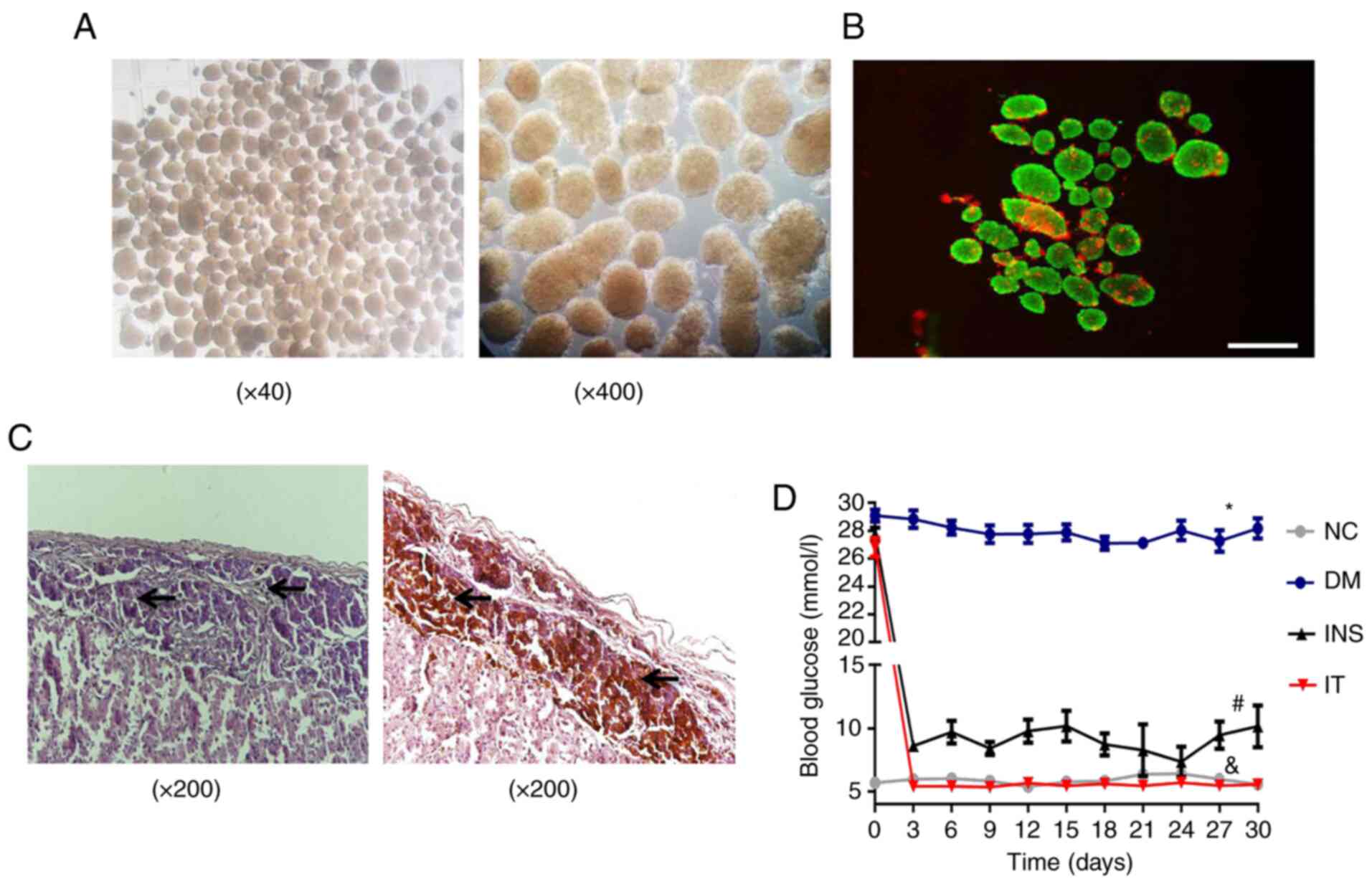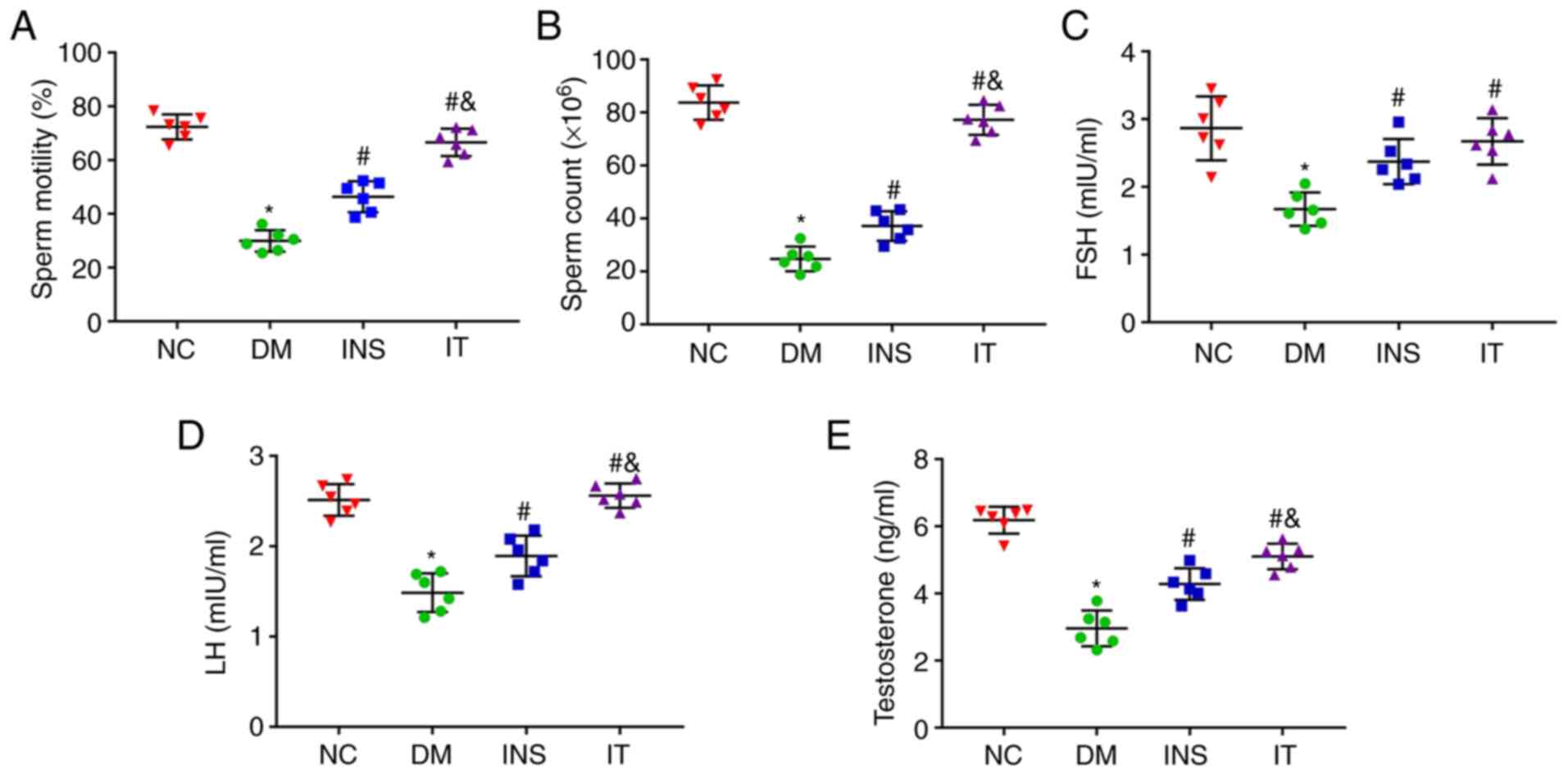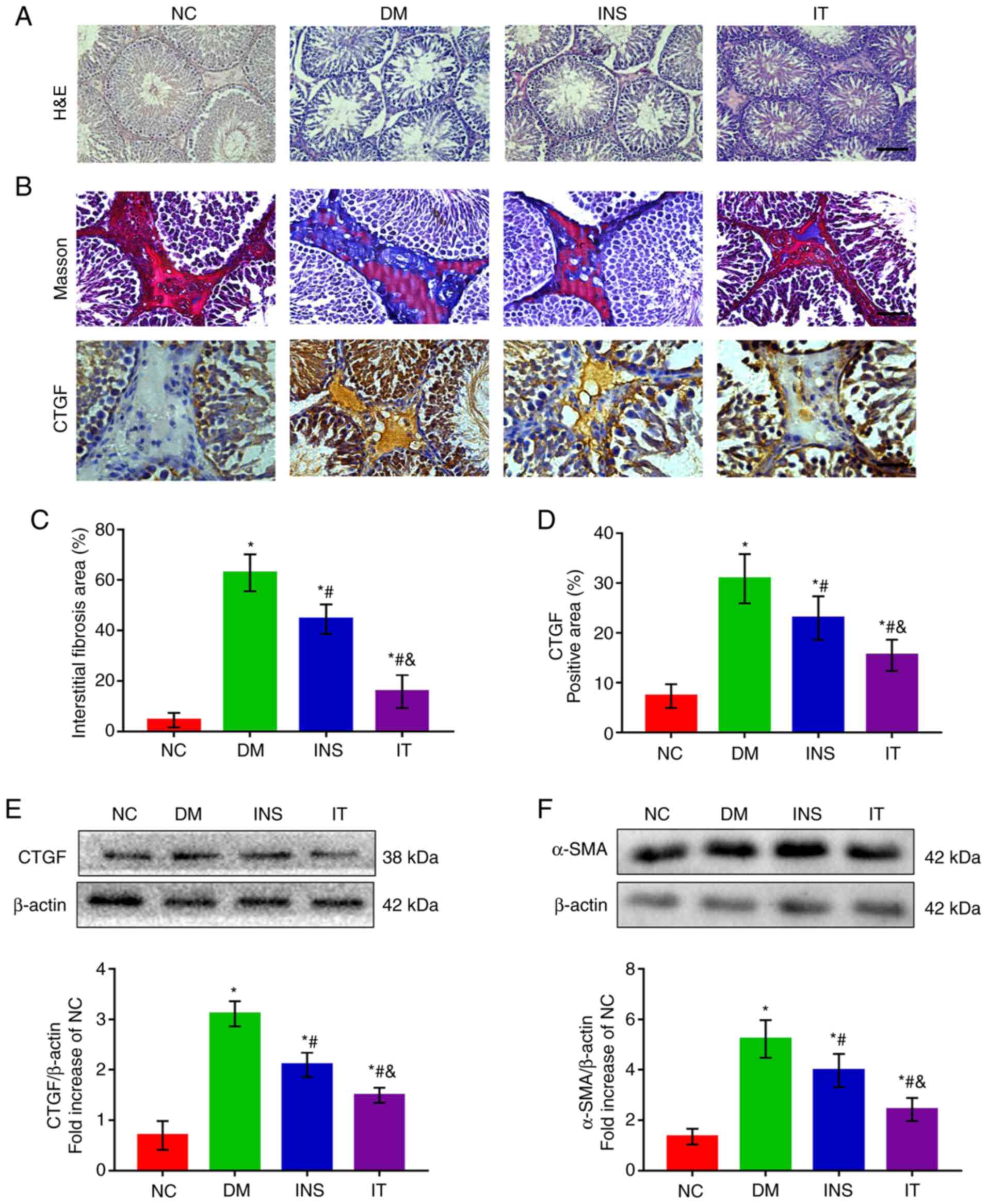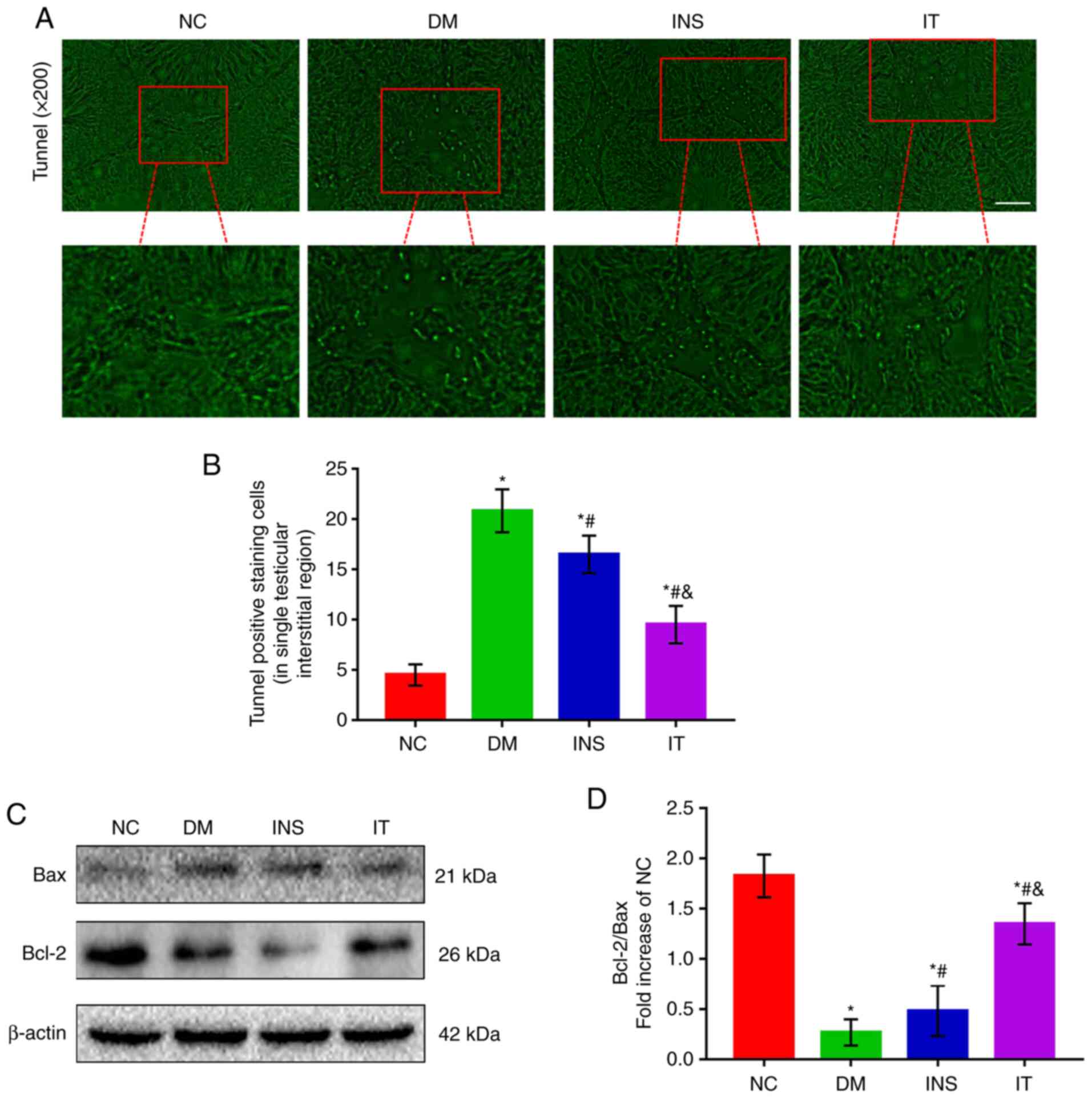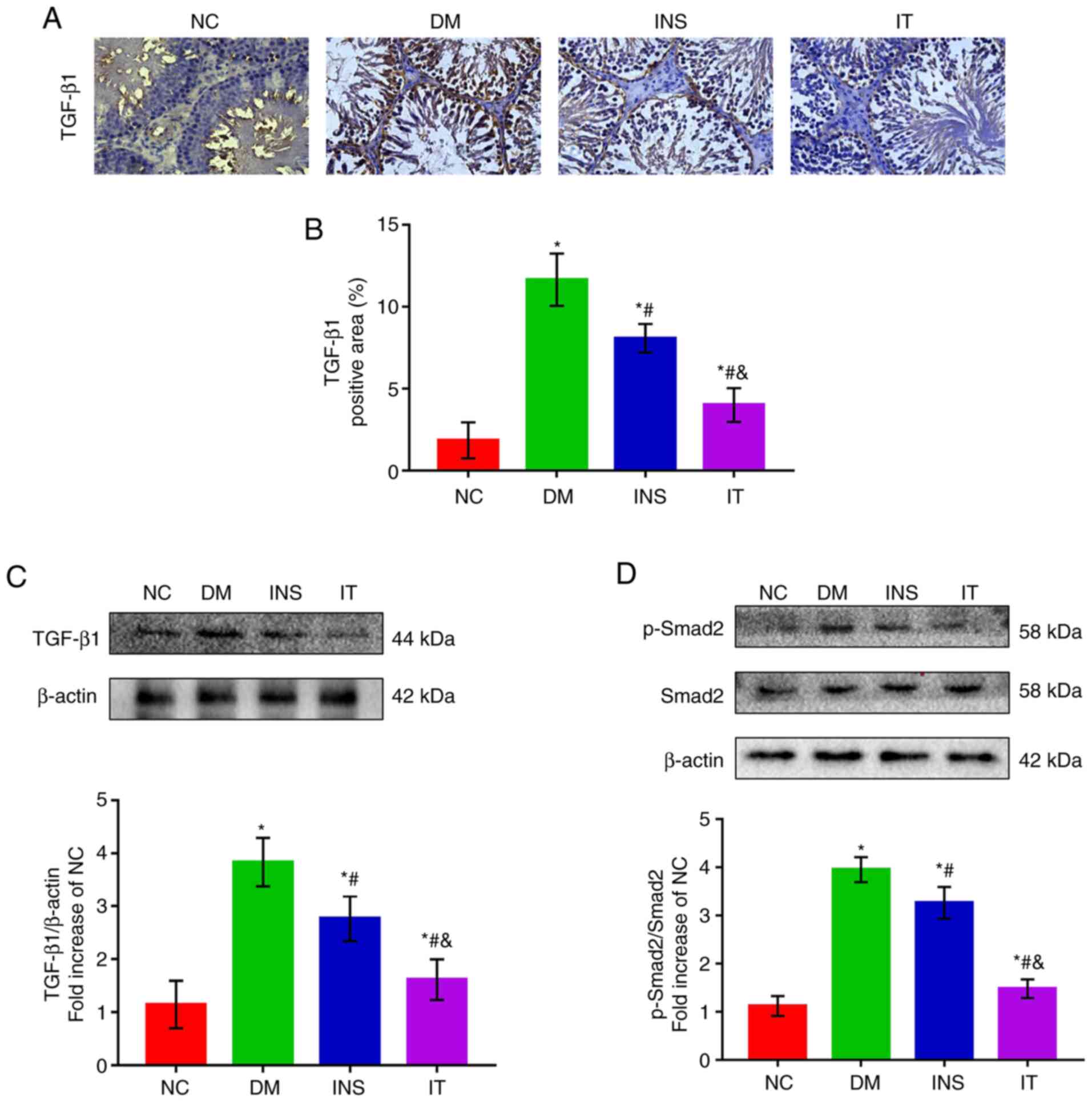|
1
|
Wang L, Gao P, Zhang M, Huang Z, Zhang D,
Deng Q, Li Y, Zhao Z, Qin X, Jin D, et al: Prevalence and ethnic
pattern of diabetes and prediabetes in China in 2013. JAMA.
317:2515–2523. 2017. View Article : Google Scholar : PubMed/NCBI
|
|
2
|
Chung WK, Erion K, Florez JC, Hattersley
AT, Hivert MF, Lee CG, McCarthy MI, Nolan JJ, Norris JM, Pearson
ER, et al: Precision medicine in diabetes: A consensus report from
the American Diabetes Association (ADA) and the European
Association for the Study of Diabetes (EASD). Diabetes Care.
43:1617–1635. 2020. View Article : Google Scholar : PubMed/NCBI
|
|
3
|
Tatone C, Di Emidio G, Barbonetti A, Carta
G, Luciano AM, Falone S and Amicarelli F: Sirtuins in gamete
biology and reproductive physiology: Emerging roles and therapeutic
potential in female and male infertility. Hum Reprod Update.
24:267–289. 2018. View Article : Google Scholar : PubMed/NCBI
|
|
4
|
Maresch CC, Stute DC, Alves MG, Oliveira
PF, de Kretser DM and Linn T: Diabetes-induced hyperglycemia
impairs male reproductive function: A systematic review. Hum Reprod
Update. 24:86–105. 2018. View Article : Google Scholar : PubMed/NCBI
|
|
5
|
Nazmy WH, Elbassuoni EA, Ali FF and Rifaai
RA: Proinsulin C-peptide as an alternative or combined treatment
with insulin for management of testicular dysfunction and fertility
impairments in streptozotocin-induced type 1 diabetic male rats. J
Cell Physiol. 234:9351–9357. 2019. View Article : Google Scholar : PubMed/NCBI
|
|
6
|
Glenn DR, McClure N and Lewis SE: The
hidden impact of diabetes on male sexual dysfunction and fertility.
Hum Fertil (Camb). 6:174–179. 2003. View Article : Google Scholar : PubMed/NCBI
|
|
7
|
Ghosh S, Chowdhury S, Das AK and Sil PC:
Taurine ameliorates oxidative stress induced inflammation and ER
stress mediated testicular damage in STZ-induced diabetic Wistar
rats. Food Chem Toxicol. 124:64–80. 2019. View Article : Google Scholar : PubMed/NCBI
|
|
8
|
Khosravi Z, Sedaghat R, Baluchnejadmojarad
T and Roghani M: Diosgenin ameliorates testicular damage in
streptozotocin-diabetic rats through attenuation of apoptosis,
oxidative stress, and inflammation. Int Immunopharmacol. 70:37–46.
2019. View Article : Google Scholar : PubMed/NCBI
|
|
9
|
Aksglaede L and Juul A: Testicular
function and fertility in men with Klinefelter syndrome: A review.
Eur J Endocrinol. 168:R67–R76. 2013. View Article : Google Scholar : PubMed/NCBI
|
|
10
|
Shiraishi K, Takihara H and Naito K:
Quantitative analysis of testicular interstitial fibrosis after
vasectomy in humans. Aktuelle Urol. 34:262–264. 2003. View Article : Google Scholar : PubMed/NCBI
|
|
11
|
Eid AH, Gad AM, Fikry EM and Arab HH:
Venlafaxine and carvedilol ameliorate testicular impairment and
disrupted spermatogenesis in rheumatoid arthritis by targeting
AMPK/ERK and PI3K/AKT/mTOR pathways. Toxicol Appl Pharmacol.
364:83–96. 2019. View Article : Google Scholar : PubMed/NCBI
|
|
12
|
Arab HH, Gad AM, Fikry EM and Eid AH:
Ellagic acid attenuates testicular disruption in rheumatoid
arthritis via targeting inflammatory signals, oxidative
perturbations and apoptosis. Life Sci. 239:1170122019. View Article : Google Scholar : PubMed/NCBI
|
|
13
|
Kolettis PN and Sabanegh ES: Significant
medical pathology discovered during a male infertility evaluation.
J Urol. 166:178–180. 2001. View Article : Google Scholar : PubMed/NCBI
|
|
14
|
Shapiro AM, Pokrywczynska M and Ricordi C:
Clinical pancreatic islet transplantation. Nat Rev Endocrinol.
13:268–277. 2017. View Article : Google Scholar : PubMed/NCBI
|
|
15
|
He Y, Zhang M, Wu Y, Jiang H, Fu H, Cai Y,
Xu Z, Liu C, Chen B and Yang T: Aberrant activation of Notch-1
signaling inhibits podocyte restoration after islet transplantation
in a rat model of diabetic nephropathy. Cell Death Dis. 9:9502018.
View Article : Google Scholar : PubMed/NCBI
|
|
16
|
Preguica I, Alves A, Nunes S, Gomes P,
Fernandes R, Viana SD and Reis F: Diet-induced rodent models of
diabetic peripheral neuropathy, retinopathy and nephropathy.
Nutrients. 12:2502020. View Article : Google Scholar
|
|
17
|
Fensom B, Harris C, Thompson SE, Al
Mehthel M and Thompson DM: Islet cell transplantation improves
nerve conduction velocity in type 1 diabetes compared with
intensive medical therapy over six years. Diabetes Res Clin Pract.
122:101–105. 2016. View Article : Google Scholar : PubMed/NCBI
|
|
18
|
Zhu X, Guo F, Tang H, Huang C, Xie G,
Huang T, Li Y, Liu C, Wang H and Chen B: Islet transplantation
attenuating testicular injury in type 1 diabetic rats is associated
with suppression of oxidative stress and inflammation via
Nrf-2/HO-1 and NF-κB pathways. J Diabetes Res. 2019:87124922019.
View Article : Google Scholar : PubMed/NCBI
|
|
19
|
Salama N, Tsuji M, Tamura M and Kagawa S:
Transforming growth factor (beta1) in testes of aged and diabetic
rats: Correlation with testicular function. Arch Androl.
47:217–226. 2001. View Article : Google Scholar : PubMed/NCBI
|
|
20
|
Kabel AM: Zinc/alogliptin combination
attenuates testicular toxicity induced by doxorubicin in rats: Role
of oxidative stress, apoptosis and TGF-β1/NF-κB signaling. Biomed
Pharmacother. 97:439–449. 2018. View Article : Google Scholar : PubMed/NCBI
|
|
21
|
Hu HH, Chen DQ, Wang YN, Feng YL, Cao G,
Vaziri ND and Zhao YY: New insights into TGF-β/Smad signaling in
tissue fibrosis. Chem Biol Interact. 292:76–83. 2018. View Article : Google Scholar : PubMed/NCBI
|
|
22
|
Tzavlaki K and Moustakas A: TGF-β
signaling. Biomolecules. 10:4872020. View Article : Google Scholar
|
|
23
|
ten Dijke P and Hill CS: New insights into
TGF-beta-Smad signalling. Trends Biochem Sci. 29:265–273. 2004.
View Article : Google Scholar : PubMed/NCBI
|
|
24
|
Ramazani Y, Knops N, Elmonem MA, Nguyen
TQ, Arcolino FO, van den Heuvel L, Levtchenko E, Kuypers D and
Goldschmeding R: Connective tissue growth factor (CTGF) from basics
to clinics. Matrix Biol. 68-69:44–66. 2018. View Article : Google Scholar : PubMed/NCBI
|
|
25
|
Hinz B, Celetta G, Tomasek JJ, Gabbiani G
and Chaponnier C: Alpha-smooth muscle actin expression upregulates
fibroblast contractile activity. Mol Biol Cell. 12:2730–2741. 2001.
View Article : Google Scholar : PubMed/NCBI
|
|
26
|
Yuan X, Pan J, Wen L, Gong B, Li J, Gao H,
Tan W, Liang S, Zhang H and Wang X: MiR-144-3p enhances cardiac
fibrosis after myocardial infarction by targeting PTEN. Front Cell
Dev Biol. 7:2492019. View Article : Google Scholar : PubMed/NCBI
|
|
27
|
National Research Council (US) Committee
for the Update of the Guide for the Care and Use of Laboratory
Animals, . Guide for the Care and Use of Laboratory Animals. 8th
edition. The National Academies Press; Washington, DC: 2011
|
|
28
|
Wang HW, Chen YH, Chen YY, Huang W, Zhu
XD, Ni FB, Wu GD, Xu ZQ, Huang ZQ, Chen BC, et al: Islet
transplantation attenuates cardiac fibrosis in diabetic rats
through inhibition of TGF-β1/Smad3 pathway. Am J Transl Res.
10:2445–2456. 2018.PubMed/NCBI
|
|
29
|
Wu Z, Wang H, Ni F, Jiang X, Xu Z, Liu C,
Cai Y, Fu H, Luo J, Chen W, et al: Islet transplantation improved
penile tissue fibrosis in a rat model of type 1 diabetes. BMC
Endocr Disord. 18:492018. View Article : Google Scholar : PubMed/NCBI
|
|
30
|
Kilarkaje N, Al-Hussaini H and Al-Bader
MM: Diabetes-induced DNA damage and apoptosis are associated with
poly (ADP ribose) polymerase 1 inhibition in the rat testis. Eur J
Pharmacol. 737:29–40. 2014. View Article : Google Scholar : PubMed/NCBI
|
|
31
|
Kolettis PN: Evaluation of the subfertile
man. Am Fam Physician. 67:2165–2172. 2003.PubMed/NCBI
|
|
32
|
Sun T, Xin Z, Jin Z, Wu Y and Gong Y:
Effect of TGF-beta/Smad signaling on sertoli cell and possible
mechanism related to complete sertoli cell-only syndrome. Mol Cell
Biochem. 319:1–7. 2008. View Article : Google Scholar : PubMed/NCBI
|
|
33
|
Li M, Liu Z, Zhuan L, Wang T, Guo S, Wang
S, Liu J and Ye Z: Effects of apocynin on oxidative stress and
expression of apoptosis-related genes in testes of diabetic rats.
Mol Med Rep. 7:47–52. 2013. View Article : Google Scholar : PubMed/NCBI
|
|
34
|
Shiraishi K, Takihara H and Naito K:
Influence of interstitial fibrosis on spermatogenesis after
vasectomy and vasovasostomy. Contraception. 65:245–249. 2002.
View Article : Google Scholar : PubMed/NCBI
|
|
35
|
Bhanmeechao C, Srisuwatanasagul S and
Ponglowhapan S: Age-related changes in interstitial fibrosis and
germ cell degeneration of the canine testis. Reprod Domest Anim. 53
(Suppl 3):37–43. 2018. View Article : Google Scholar : PubMed/NCBI
|
|
36
|
Hoffman WH, Kovacs KT, Gala RR, Keel BA,
Jarrell TS, Ellegood JO and Burek CL: Macroorchidism and testicular
fibrosis associated with autoimmune thyroiditis. J Endocrinol
Invest. 14:609–616. 1991. View Article : Google Scholar : PubMed/NCBI
|
|
37
|
Wang F, Liu W, Jiang Q, Gong M, Chen R, Wu
H, Han R, Chen Y and Han D: Lipopolysaccharide-induced testicular
dysfunction and epididymitis in mice: A critical role of tumor
necrosis factor alpha. Biol Reprod. 100:849–861. 2019. View Article : Google Scholar : PubMed/NCBI
|
|
38
|
Kangawa A, Otake M, Enya S, Yoshida T and
Shibata M: Histological Changes of the Testicular Interstitium
during Postnatal Development in Microminipigs. Toxicol Pathol.
47:469–482. 2019. View Article : Google Scholar : PubMed/NCBI
|
|
39
|
Cellek S, Foxwell NA and Moncada S: Two
phases of nitrergic neuropathy in streptozotocin-induced diabetic
rats. Diabetes. 52:2353–2362. 2003. View Article : Google Scholar : PubMed/NCBI
|
|
40
|
Choi WS, Kwon OS, Cho SY, Paick JS and Kim
SW: Effect of chronic administration of PDE5 combined with glycemic
control on erectile function in streptozotocin-induced diabetic
rats. J Sex Med. 12:600–610. 2015. View Article : Google Scholar : PubMed/NCBI
|
|
41
|
Poradzka A, Wroński J, Jasik M, Karnafel W
and Fiedor P: Insulin replacement therapy in patients with type 1
diabetes by isolated pancreatic islet transplantation. Acta Pol
Pharm. 70:943–950. 2013.PubMed/NCBI
|
|
42
|
Beltrán del Río M, Georgiev GI, Cercone R,
Tiwari M and Rilo HL: Continuous glucose monitoring analysis as
predictor of islet yield and insulin requirements in autologous
islet transplantation after complete pancreatectomy. J Diabetes Sci
Technol. 8:1097–1104. 2014. View Article : Google Scholar : PubMed/NCBI
|
|
43
|
Oka S, Shiraishi K and Matsuyama H:
Effects of human chorionic gonadotropin on testicular interstitial
tissues in men with non-obstructive azoospermia. Andrology.
5:232–239. 2017. View Article : Google Scholar : PubMed/NCBI
|
|
44
|
Lv W, Zhang L, Cheng X, Wang H, Qin W,
Zhou X and Tang B: Apelin Inhibits Angiotensin II–Induced Atrial
Fibrosis and Atrial Fibrillation via TGF-β1/Smad2/α-SMA Pathway.
Front Physiol. 11:5835702020. View Article : Google Scholar : PubMed/NCBI
|
|
45
|
Liu F and Kong Y: GLP-1 receptor agonist
on cardiovascular complications of diabetes mellitus. Exp Ther Med.
19:2259–2265. 2020.PubMed/NCBI
|
|
46
|
Roep BO: Improving clinical islet
transplantation outcomes. Diabetes Care. 43:698–700. 2020.
View Article : Google Scholar : PubMed/NCBI
|















